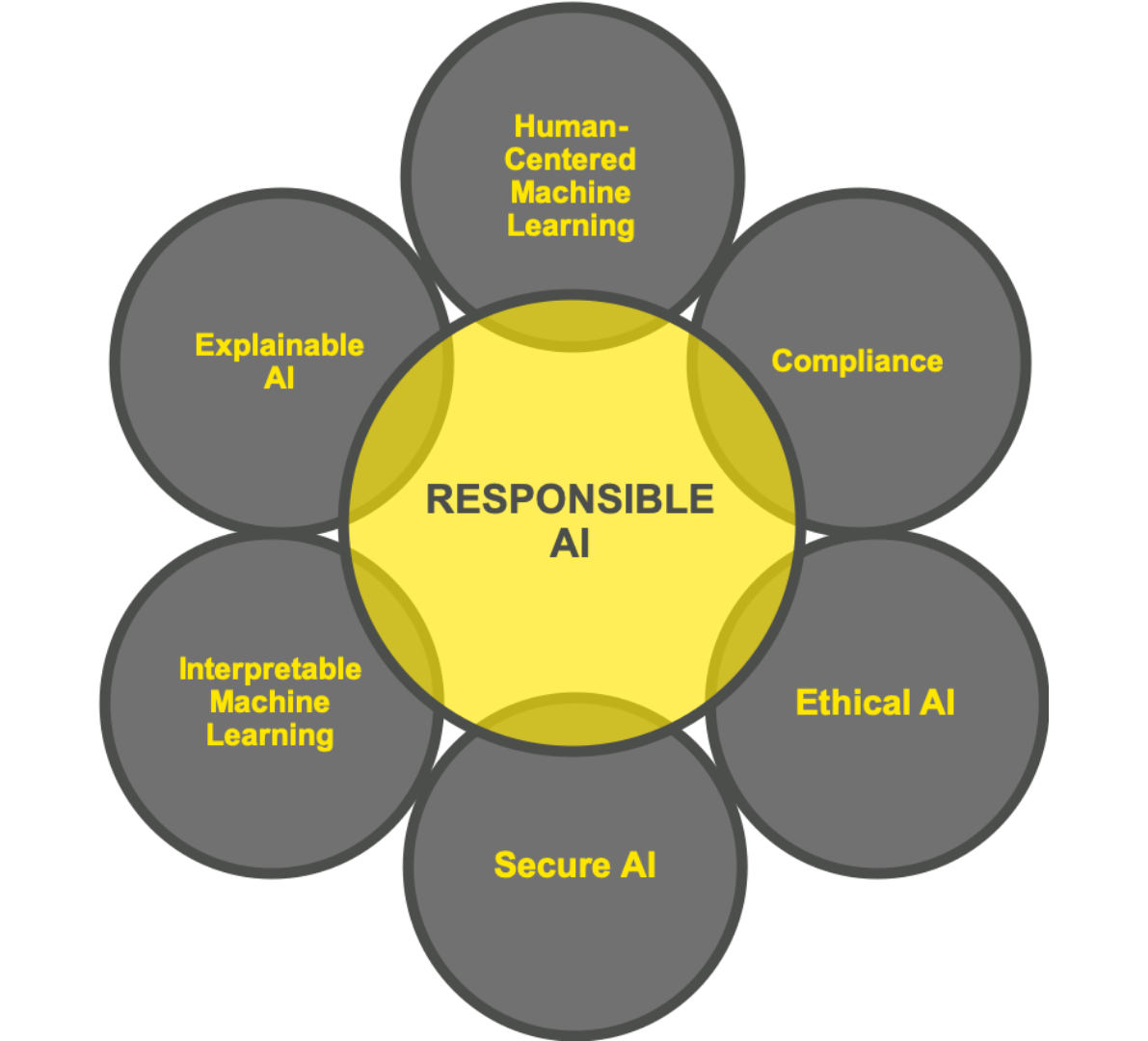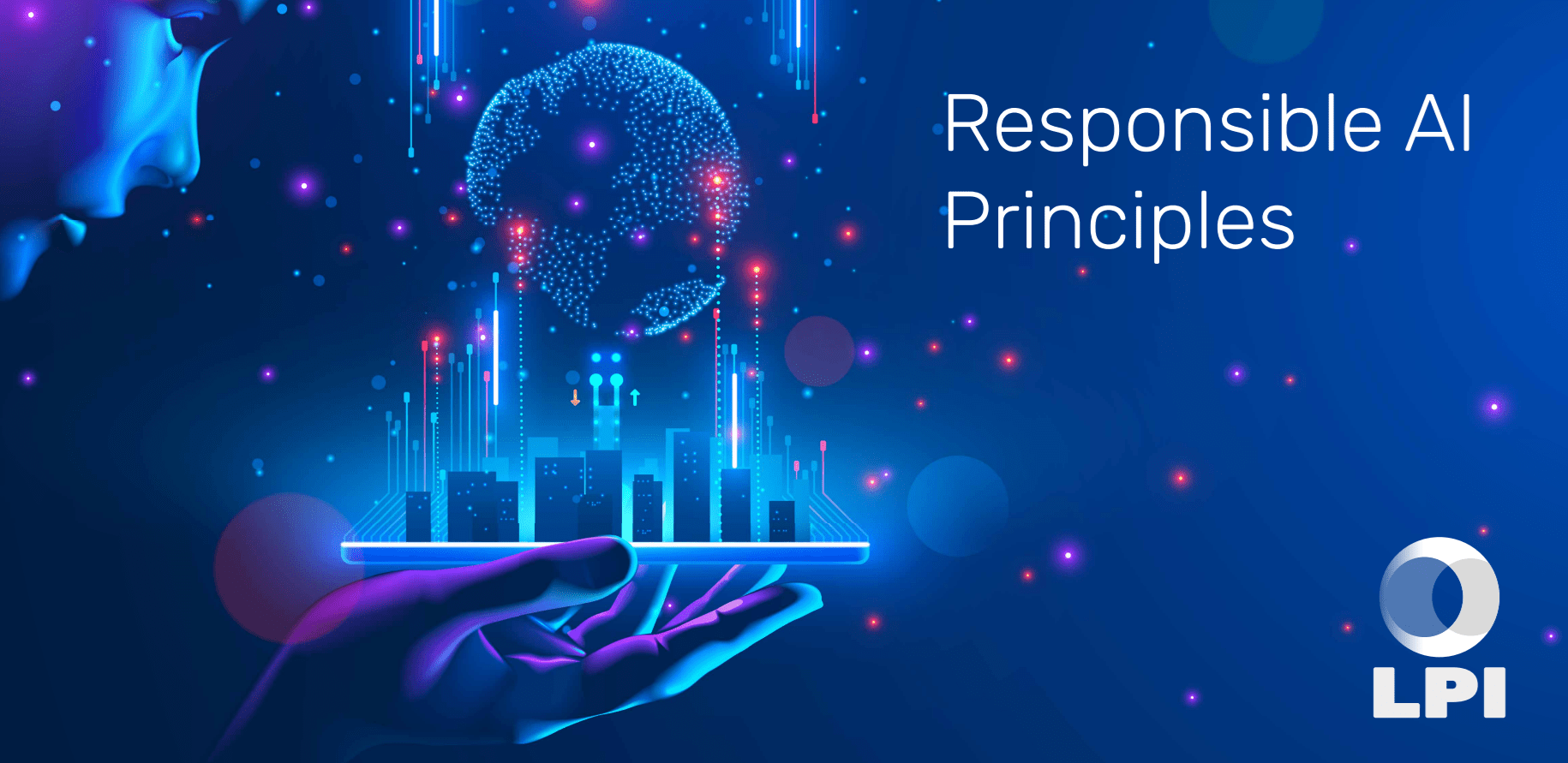Responsible AI: Navigating the Future of Artificial Intelligence
Introduction
In recent years, artificial intelligence (AI) has transformed various sectors, from healthcare to finance, education to entertainment. As we embrace this technology, the concept of responsible AI has emerged as a critical topic of discussion. Responsible AI refers to the development and deployment of AI systems that are ethical, transparent, and aligned with human values. This blog explores the importance of responsible AI, its principles, challenges, and the steps we can take to ensure that AI benefits society as a whole.

What is Responsible AI?
Responsible AI encompasses a set of practices and principles aimed at ensuring that AI technologies are developed and used in ways that are ethical and beneficial. It involves several key components:
- Ethics: Ensuring that AI systems are designed and operated in a manner that respects human rights and promotes fairness.
- Transparency: Making AI systems understandable and explainable to users and stakeholders, allowing them to comprehend how decisions are made.
- Accountability: Establishing clear lines of responsibility for the outcomes of AI systems, ensuring that organizations are held accountable for their use of AI.
- Inclusivity: Ensuring that AI systems are designed to be inclusive and accessible to all, avoiding biases that could lead to discrimination.
- Safety and Security: Prioritizing the safety and security of AI systems to prevent misuse and harmful outcomes.
The Importance of Responsible AI
The significance of responsible AI cannot be overstated. As AI technologies become more pervasive, the potential for misuse and unintended consequences increases. Here are some reasons why responsible AI is crucial:
1. Mitigating Bias and Discrimination
AI systems are often trained on historical data, which may contain biases that can perpetuate discrimination. For example, facial recognition technologies have been shown to have higher error rates for individuals with darker skin tones. Responsible AI practices aim to identify and mitigate these biases, ensuring that AI systems treat all individuals fairly.
2. Building Trust
For AI to be widely accepted, users must trust these systems. Transparency in how AI models operate and the decisions they make is essential for building this trust. When users understand the rationale behind AI decisions, they are more likely to accept and embrace the technology.
3. Ensuring Accountability
As AI systems make more autonomous decisions, it becomes increasingly important to establish accountability. Who is responsible when an AI system makes a mistake? Responsible AI frameworks help clarify these responsibilities, ensuring that organizations are held accountable for their AI systems' actions.
4. Promoting Human-Centric AI
Responsible AI emphasizes the importance of keeping human values at the forefront of AI development. This human-centric approach ensures that AI serves to enhance human experiences rather than replace them, promoting collaboration between humans and machines.
5. Complying with Regulations
As governments and regulatory bodies around the world begin to establish guidelines for AI, organizations must adopt responsible AI practices to comply with these regulations. This proactive approach can help mitigate legal risks and enhance an organization's reputation.
Principles of Responsible AI
To achieve responsible AI, several principles should guide the development and deployment of AI systems:
1. Fairness
AI systems should be designed to promote fairness and avoid discrimination. This involves using diverse datasets, regularly auditing algorithms for bias, and implementing fairness metrics to evaluate outcomes.
2. Transparency
Transparency is essential for understanding AI systems. Organizations should provide clear documentation of AI models, including how they were trained, the data used, and the decision-making processes involved.
3. Privacy
Respecting user privacy is a fundamental principle of responsible AI. Organizations must implement robust data protection measures and ensure that personal data is used ethically and responsibly.
4. Safety
AI systems should be designed with safety in mind, minimizing risks to users and society. This includes conducting thorough testing and validation of AI systems before deployment.
5. Collaboration
Collaboration among stakeholders, including researchers, policymakers, and industry leaders, is essential for developing responsible AI practices. Sharing knowledge and best practices can help create a more ethical AI landscape.

Challenges in Implementing Responsible AI
While the principles of responsible AI are clear, implementing them presents several challenges:
1. Data Quality and Bias
Ensuring data quality is a significant challenge in AI development. Poor-quality data can lead to biased outcomes, and addressing this issue requires ongoing efforts to collect diverse and representative datasets.
2. Lack of Standardization
The absence of standardized frameworks for responsible AI makes it difficult for organizations to implement best practices consistently. Establishing industry-wide standards is essential for promoting responsible AI.
3. Rapid Technological Advancements
The pace of AI development often outstrips the ability of regulatory bodies to keep up. This creates a gap where potentially harmful technologies can be deployed without adequate oversight.
4. Balancing Innovation and Regulation
Striking a balance between fostering innovation and implementing necessary regulations is a complex challenge. Organizations must navigate this landscape carefully to avoid stifling creativity while ensuring ethical practices.
5. Education and Awareness
There is a need for greater education and awareness around responsible AI, both within organizations and among the general public. Building a culture of responsibility requires ongoing training and dialogue.
Steps Towards Responsible AI
To move towards responsible AI, organizations can take several actionable steps:
1. Establish a Governance Framework
Organizations should establish a governance framework that outlines the principles and practices of responsible AI. This framework should include guidelines for ethical AI development, accountability measures, and processes for auditing AI systems.
2. Invest in Training and Education
Investing in training programs for employees at all levels can help foster a culture of responsibility. This includes educating teams about the ethical implications of AI, bias mitigation strategies, and the importance of transparency.
3. Engage Stakeholders
Engaging with stakeholders, including customers, employees, and community members, can provide valuable insights into the ethical considerations of AI development. Collaborative efforts can lead to more inclusive and responsible AI systems.
4. Conduct Regular Audits
Regular audits of AI systems can help identify biases and areas for improvement. Organizations should implement processes for ongoing evaluation and refinement of their AI technologies.
5. Advocate for Policy Change
Organizations can play a role in advocating for responsible AI policies at the local, national, and international levels. Engaging with policymakers and contributing to the development of regulations can help shape a more ethical AI landscape.

Case Studies of Responsible AI
1. IBM Watson Health
IBM Watson Health has focused on responsible AI by prioritizing transparency and collaboration in its healthcare solutions. The platform provides explainable AI features, allowing healthcare professionals to understand the reasoning behind AI-generated recommendations. This approach helps build trust and ensures that AI complements human expertise. For more information, visit IBM AI Ethics.
2. Microsoft AI Principles
Microsoft has established a set of AI principles that guide its AI development efforts. These principles emphasize fairness, reliability, privacy, and inclusiveness. By committing to these principles, Microsoft aims to create AI technologies that empower individuals and communities while minimizing risks. Learn more at Microsoft Responsible AI.
3. Google’s AI Ethics Board
In response to growing concerns about AI ethics, Google established an AI ethics board to oversee its AI initiatives. This board is responsible for ensuring that AI technologies align with ethical standards and societal values. By incorporating diverse perspectives, Google aims to address potential biases and promote responsible AI practices.
Resources for Further Learning
To deepen your understanding of responsible AI, here are some high-quality resources, including videos, articles, and reports:
Videos
- "What is Responsible AI?" - Microsoft
- Microsoft Responsible AI
- This video by Microsoft explains the concept of responsible AI, highlighting their principles and initiatives to create ethical AI systems.
- "The Ethical Implications of AI" - TEDx Talks
- TEDx Talks on AI Ethics
- In this TEDx talk, the speaker discusses the ethical implications of AI technologies and the importance of developing AI responsibly to avoid potential harms.
- "How AI Can Be Responsible" - IBM
- IBM AI Ethics
- This video from IBM explores how AI can be developed responsibly, covering the importance of ethics in AI.
Articles and Reports
- "AI Ethics: A Guide to Responsible AI" - Stanford University
- Stanford AI Ethics
- This comprehensive guide from Stanford University covers the principles of AI ethics, including fairness, accountability, and transparency.
- "The AI Ethics Guidelines Global Inventory" - AlgorithmWatch
- AI Ethics Guidelines
- This inventory compiles various AI ethics guidelines from around the world, providing a valuable resource for understanding the global landscape of responsible AI initiatives.
- "Responsible AI: A Global Policy Framework" - World Economic Forum
- WEF Responsible AI
- This report outlines a global policy framework for responsible AI, discussing the role of governments, businesses, and civil society in promoting ethical AI practices.
- "Ethics of Artificial Intelligence and Robotics" - Stanford Encyclopedia of Philosophy
- Stanford Encyclopedia
- This entry in the Stanford Encyclopedia of Philosophy provides an in-depth analysis of the ethical considerations surrounding AI and robotics.
Online Courses
- "AI For Everyone" - Coursera
- AI For Everyone
- This course, taught by Andrew Ng, provides a non-technical introduction to AI, including discussions on ethical considerations and responsible AI practices.
- "Responsible AI: Mitigating Bias and Ensuring Fairness" - edX
- edX Responsible AI
- This course focuses on understanding bias in AI systems and how to implement strategies to ensure fairness in AI development.
Research Papers
- "Fairness and Abstraction in Sociotechnical Systems" - Selbst et al.
- Fairness and Abstraction
- This research paper discusses the challenges of achieving fairness in sociotechnical systems and the implications for responsible AI development.
- "The Malicious Use of Artificial Intelligence: Forecasting, Prevention, and Mitigation" - Brundage et al.
- Malicious Use of AI
- This paper explores the potential malicious uses of AI and provides recommendations for mitigating risks associated with AI technologies.

The Future of Responsible AI
As AI continues to evolve, the importance of responsible AI will only grow. The future of AI depends on our ability to navigate the ethical challenges it presents. Here are some trends to watch for in the coming years:
1. Increased Regulation
Governments worldwide are beginning to implement regulations governing AI technologies. Organizations must stay informed about these regulations and adapt their practices accordingly.
2. Greater Emphasis on Explainability
As AI systems become more complex, the demand for explainability will increase. Organizations will need to invest in developing AI models that provide clear and understandable explanations for their decisions.
3. Focus on Human-AI Collaboration
The future of AI will likely involve greater collaboration between humans and machines. Responsible AI practices will emphasize the importance of enhancing human capabilities rather than replacing them.
4. Advancements in Bias Mitigation
Research into bias mitigation techniques will continue to advance, providing organizations with tools to identify and address biases in AI systems more effectively.
5. Global Collaboration
Addressing the challenges of responsible AI will require global collaboration among governments, organizations, and researchers. Sharing knowledge and best practices will be essential for creating a more ethical AI landscape.
Conclusion
Responsible AI is not just a trend; it is a necessity for ensuring that AI technologies are developed and deployed ethically and responsibly. By embracing the principles of fairness, transparency, accountability, inclusivity, and safety, we can navigate the complexities of AI and harness its potential for good. As we move forward, it is crucial for organizations, policymakers, and individuals to work together to create a future where AI serves humanity and reflects our shared values. The journey towards responsible AI is ongoing, and each step we take brings us closer to a more equitable and just society.
No comments: